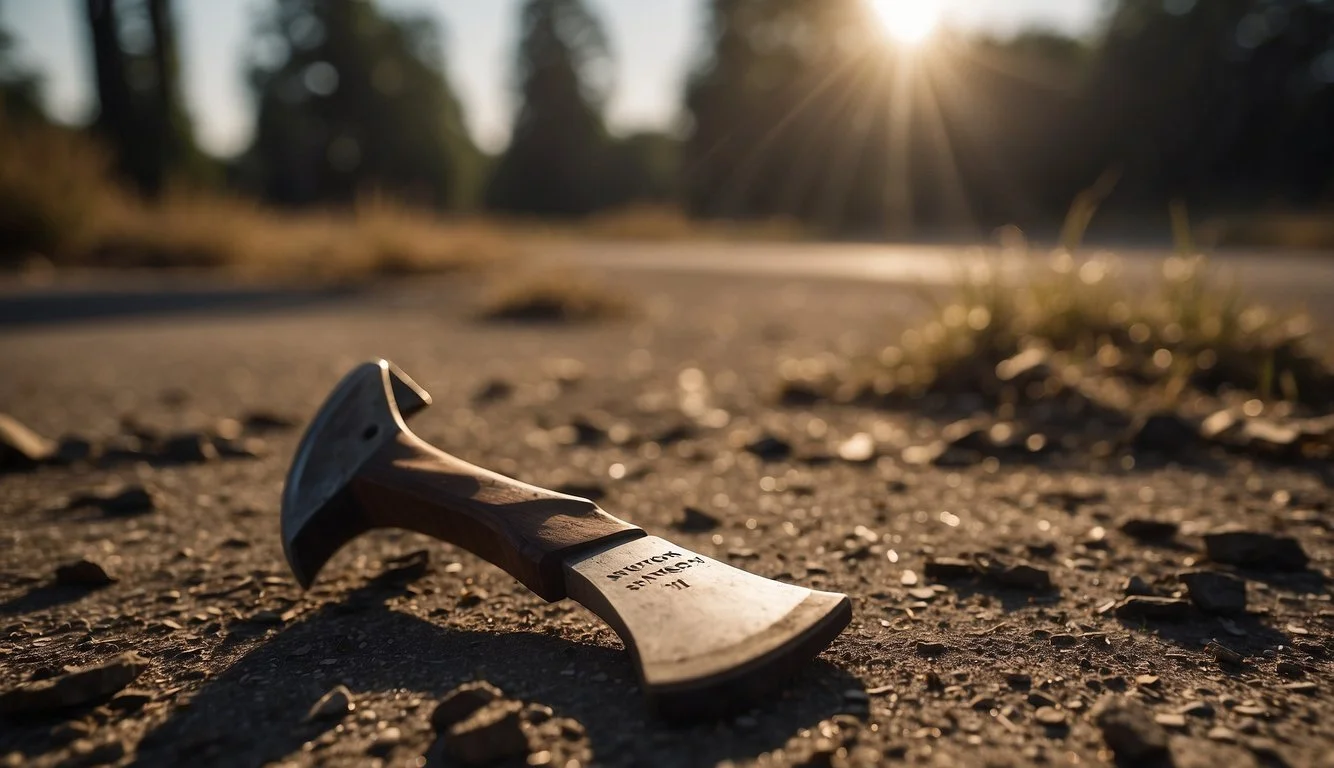Documentary Review: The Hatchet Wielding Hitchhiker (2023)
A Deep Dive into Unexpected Fame
The 2023 Netflix documentary "The Hatchet Wielding Hitchhiker" tells the astonishing tale of Kai Lawrence, an unhoused young man who skyrocketed to viral fame after a dramatic act of heroism. Directed by Colette Camden, this true-crime film dives deep into the brief, tumultuous journey from Kai’s moment in the spotlight to his eventual incarceration.
With stunning interviews and real-life footage, the documentary paints a vivid picture of a carefree nomad catapulted into the public eye, only to face a rapid and devastating fall from grace. This shocking documentary chronicles a happy-go-lucky nomad's ascent to viral stardom and the steep downward spiral that resulted in his imprisonment.
Exploring themes of media frenzy, societal fascination with instant fame, and the dark underbelly of viral success, "The Hatchet Wielding Hitchhiker" offers a gripping narrative that is both thrilling and tragic. Kail's story serves as a sobering reminder of how quickly public perception can shift, and the profound impact it can have on an individual's life.
Overview of 'The Hatchet Wielding Hitchhiker'
The Hatchet Wielding Hitchhiker presents a gripping tale of Caleb "Kai" McGillvary's rise to internet fame and his subsequent downfall. This documentary explores the circumstances that led to his brief moment of stardom and the tragic events that followed.
Synopsis
Caleb "Kai" McGillvary, a homeless nomad, quickly became a viral sensation in 2023. He gained fame after saving a woman from a violent attack using a hatchet—his weapon of choice. The attacker was the same man who had given him a ride earlier. Kai's candid and charismatic interview with local TV reporter Jessob Reisbeck compounded his internet stardom.
However, the documentary reveals the dark side of Kai's story. His fame was short-lived, and soon he was embroiled in legal troubles. The film delves into the criminal activities and volatile behavior that led to his imprisonment. It also highlights the media's role in catapulting him to fame and then discarding him.
Context and Background
The story of Kai the Hatchet Wielding Hitchhiker is not just about a viral hero; it is a look into the life of a troubled individual. Kai, whose real name is Caleb McGillvary, had a difficult past marked by alleged abuse. He led a life without stable housing, often hitchhiking across states.
The documentary also examines the societal and media dynamics at play. In 2023, the internet's rapid dissemination of Kai's story and his unfiltered, charismatic persona struck a chord with the public. TV crews and fans were eager to associate with him, turning him into a fleeting social media icon. However, as his dark past and erratic behavior came to light, public fascination quickly turned to disinterest and condemnation.
Production Details
"The Hatchet Wielding Hitchhiker" presents a meticulous portrayal of the rise and fall of Kai Lawrence. This section covers the director's creative approach, the cinematographic techniques, and the audio elements that shape the documentary's atmosphere.
Director's Vision
Director Colette Camden masterfully brings Kai's tumultuous journey to life. Her focused narrative approach ensures that the documentary remains engaging. She captures the raw essence of Kai's story by balancing his heroic actions with the darker sides of his personality. Camden also avoids sensationalism, aiming instead to provide a nuanced look at the complexities of Kai's life. Her intention seems to highlight the human behind the viral sensation, creating a sobering reflection on fame and downfall.
Cinematography
The cinematography in "The Hatchet Wielding Hitchhiker" employs a mix of archival footage and contemporary interviews. This blend helps situate viewers in the timelines of Kai's sudden rise and subsequent decline. The visual style maintains a gritty, realistic feel, which parallels the raw and unfiltered nature of Kai's life. Close-up shots are frequently used to capture the emotional weight carried by interviewees. The documentary effectively uses light and shadow to underscore moments of tension, lending an almost cinematic quality to real-life events.
Music and Sound Design
The music and sound design play critical roles in setting the documentary's tone. Subtle background scores heighten emotional moments without overpowering the narrative. Sound effects are employed judiciously to evoke the internal states of the characters, particularly during pivotal scenes involving Kai's actions and reactions. The audio mixing ensures that dialogue remains clear and impactful, enhancing the viewer's connection to the story being told. The use of diegetic and non-diegetic sounds creates an immersive experience, making the documentary not just a visual but also an auditory journey.
Themes and Messages
This documentary delves into societal reactions to viral fame, ethical gray areas in media interaction, and the psychological ramifications of trauma in the life of Kai, the titular Hatchet Wielding Hitchhiker.
Social Commentary
The shift in Kai's status from hero to criminal illuminates the volatile nature of public opinion. His story highlights how society tends to idolize individuals who become viral sensations. Media influence plays a significant role, turning his spontaneous act of heroism into a widespread phenomenon.
Kai's case also underscores issues of homelessness, mental health, and trauma. The documentary critiques how society often fails to address these underlying problems, instead opting to sensationalize them for entertainment. This treatment reflects broader societal tendencies to overlook deeper issues in favor of more digestible narratives.
Legal and Ethical Issues
The documentary raises important questions about media ethics and the legal responsibilities surrounding Kai's case. Journalistic integrity is scrutinized, focusing on how outlets pursued sensational stories at the cost of ethical considerations. The rush to capitalize on Kai's viral fame led to numerous ethical lapses, including inadequate vetting and lack of support for his troubled past.
The legal complications of Kai's actions post-heroism become a focal point. Murder charges and subsequent trials expose the legal system's struggles to differentiate between heroism and criminality. The documentary also questions the responsibility of those who propelled him into the limelight, probing whether they share some blame for his downward spiral.
Psychological Perspectives
Kai’s psychological state is a critical element in this narrative. His history of childhood abuse and unstable lifestyle are explored as factors that significantly influenced his behavior. The documentary offers insights into his mental health struggles, examining how untreated trauma and personality disorders may have contributed to his drastic actions.
Expert commentary provides a clinical view of Kai’s behavior, shedding light on how societal neglect and personal trauma intersect. This perspective highlights the importance of mental health support and the dangers of ignoring psychological issues in individuals thrust into sudden fame.
By structuring the documentary around these themes, viewers gain a nuanced understanding of the complex interplay between societal influences, ethical responsibilities, and psychological factors in Kai's tragic trajectory.
Cast and Characters
The documentary features an intriguing mix of primary subjects and various supporting interviews. It provides an in-depth look at the personalities involved and their complex motivations and actions.
Lead Subjects
Kai Lawrence emerges as the central figure of the documentary. Known for his impromptu heroism, Kai's character unfolds from that of a seemingly cheerful nomad to a tragic figure whose viral fame spirals into chaos. His transformation from a social media sensation to a convicted criminal is captured through various interviews and footage. This dual nature of Kai's persona is deeply explored, adding layers to his character beyond the initial hero narrative.
Jessob Reisbeck plays a crucial role as the journalist who initially brought Kai's story to the public eye. Reisbeck's interactions with Kai provide insights into how media attention can influence individuals' lives. His perspective offers an essential counterpoint to Kai's narrative, highlighting the impact of sudden fame.
Supporting Interviews
The documentary features several interviews with individuals who interacted with Kai throughout his journey.
Terry Woods and Brad Mulcahy are among those who provide recollections of their experiences with Kai. Their accounts help to paint a comprehensive picture of Kai's personality and the events leading up to his criminal activities. These supporting voices help to add depth to the documentary, illustrating how Kai's actions affected those around him.
Additionally, law enforcement officials and legal experts contribute their views on the case, explaining the legal ramifications of Kai’s actions. Such interviews offer a balanced perspective on the story, blending personal anecdotes with professional insights.
Character Analysis
In examining Kai's character, the documentary delves into his psychological make-up.
Kai is portrayed as a complex individual, balancing his early portrayal as a hero with the darker aspects that later emerged. His charismatic yet unpredictable nature is a focal point, raising questions about the fine line between heroism and criminality.
Jessob Reisbeck’s character is analyzed through his role in bringing Kai to prominence. His ethical considerations and reflections on the influence of media are scrutinized, providing a meta-narrative on journalistic responsibility.
The supporting characters, such as those interviewed, are analyzed for their varying reactions to Kai's fluctuating persona. Their perspectives contribute to a nuanced understanding of how a public figure can simultaneously be a savior and a villain.
Critical Reception
The critical reception of The Hatchet Wielding Hitchhiker has been mixed, exploring both the unexpected virality of its subject and the darker elements leading to his downfall.
Critics' Reviews
Graeme Tuckett of Stuff.co.nz praises the documentary for its coherent narrative and engaging storytelling. Highlighting the transition from internet fame to tragedy, Tuckett notes that the film's strength lies in its detailed recounting of events.
Decider commends director Colette Camden for her skillful recounting of Kai's spontaneous heroism and subsequent issues. The review underscores the adept balancing of human interest elements with the graver aspects of the story.
Ready Steady Cut echoes the sentiment by calling it a "wild but ultimately sad story," emphasizing the quick shift from heroism to downfall. It's A Stampede! describes the documentary as shocking and gripping, crediting it for diving into both the rise and fall of Caleb 'Kai' McGillvary.
Audience Response
Viewers on Rotten Tomatoes hold varied opinions. Many appreciate the film's in-depth look into a unique story, praising it for covering both the viral sensation and the darker aftermath.
Audience members have also praised The Hatchet Wielding Hitchhiker for its compelling subject matter and detailed narrative structure. However, some viewers feel the documentary at times ventures into sensationalism, which detracts from the gravity of the real-life events it portrays.
Online forums and social media platforms reveal a thread of fascination mingled with discomfort, reflecting the complex emotions invoked by Kai's story.
Comparative Analysis
In comparison to other true-crime documentaries, The Hatchet Wielding Hitchhiker stands out for its combination of virality and tragedy.
While similar films often focus solely on either the rise to fame or the criminal aspects, this documentary bridges both with a balance rarely seen. Its detailed approach and robust narrative structure earn it recognition in the true crime genre, serving as a case study in the perils of instant fame.
Other documentaries' focuses tend to be more singular, lacking the dual narrative of heroism and decay that this film offers, making it unique yet familiar within its category.
Impact and Relevance
"The Hatchet Wielding Hitchhiker" (2023) not only recounts a gripping true-crime story, but also carries significant cultural and societal implications. These aspects are explored in terms of the cultural impact, relevance to current events, and its potential to inspire social change.
Cultural Impact
This documentary highlights the transient nature of internet fame. Caleb "Kai" Lawrence McGillvary’s rise from a viral sensation to a convicted criminal reflects society's fascination with instant celebrities. Media's role in shaping public perception is evident as Kai's heroics were initially celebrated widely online.
The film also underscores the complexity of virality and its often short-lived nature. This cultural phenomenon shows how quickly narratives can shift, influenced by the relentless news cycle and social media trends.
Relevance to Current Events
Kai's story remains pertinent amid ongoing discussions about homelessness and mental health. As homelessness continues to be a pressing social issue, the documentary sheds light on the vulnerabilities faced by many individuals in these circumstances.
Moreover, the true-crime genre’s popularity underscores public interest in stories that combine elements of justice, heroism, and tragedy. The film’s release amidst growing conversations about mental health awareness underscores its contemporary relevance.
Potential for Social Change
The film has the potential to spark discussions around the treatment and representation of unhoused individuals. By shifting public discourse, it encourages a more nuanced understanding of homelessness beyond media stereotypes.
Additionally, Kai’s story prompts conversations about the criminal justice system and its handling of mental health issues. The documentary calls for improved mental health resources and support systems, potentially influencing both policymakers and the general public to advocate for systemic changes.
Conclusion and Final Thoughts
"The Hatchet Wielding Hitchhiker" offers an engaging dive into the life story of Caleb "Kai" Lawrence McGillvary. The documentary successfully explores his rapid rise to internet fame and the subsequent fall into notoriety.
Kai's journey from hero to convicted criminal is presented with a balanced narrative. The film presents the complexities of his personality and the unpredictable nature of his actions.
Directed by Colette Camden, the documentary uses a straightforward approach. The interviews and archival footage help provide a comprehensive picture. The narrative holds attention, shedding light on the broader implications of instant fame and the media's influence.
Overall, "The Hatchet Wielding Hitchhiker" serves as a thought-provoking look at the intersections of heroism, mental health, and media frenzy. The film manages to be compelling without sensationalizing the tragic aspects of Kai's story. It leaves the audience with much to ponder.






